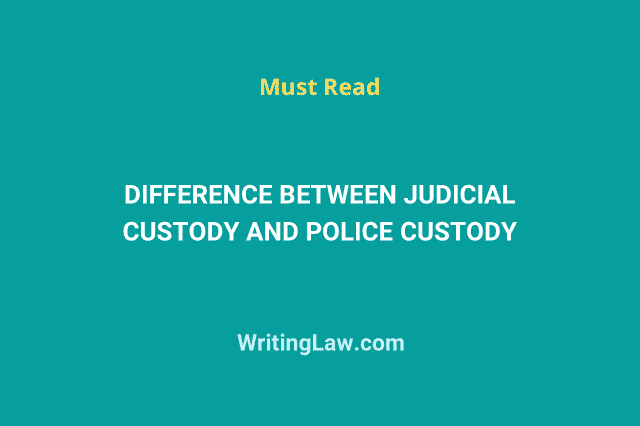
When a person is arrested for any reason, he is taken into custody for questioning and further investigations.
What does an arrest mean? An arrest is nothing but restricting a person’s liberty. Secondly, custody in the general sense is care and protection but here, the meaning of custody changes from care and protection to detention since it is preceded by arrest.
Custody is of two types – Police Custody and Judicial Custody. In this law note, let us learn the meaning of both.
What Is Police Custody
After the commission of a crime, when the police officer arrests the person involved to prevent further crime and proceed with the investigation, they bring the person to the police station. This is called police custody.
It is the detention of a suspect in the custody of the police in the police lock-up at the police station. The police officer in charge of the case may examine the suspect during this detention, which should not last more than 24 hours.
Within 24 hours, the person arrested is to be produced before the magistrate. In this case, custody refers to police lock-up. According to section 167 of CrPC, a person may be held in police custody for 15 days on the magistrate’s orders.
Related: What if the investigation cannot be completed in 24 hours? You can learn about it here – Section 167 CrPC Explained.
What Is Judicial Custody
Law students and normal people often look for the meaning of judicial custody. Let me briefly tell you what this is.
In general, judicial custody is the custody of the magistrate. When the accused surrenders before the magistrate, the magistrate will either release the accused on bail or keep him in judicial custody or send him back to police custody.
In the case of judicial custody, custody refers to jail. Jail can be Central Jail or State Jail. Judicial custody may extend to 90 days for serious or grievous crimes with capital punishment such as death, imprisonment for life etc. and 60 days for the rest of the crimes.
Note: If a person is lodged in police custody, the number of days of his stay during lock-up is subtracted from judicial custody.
Case Laws for Police Custody and Judicial Custody
Case Law 1: CBI vs Anupam Kulkarni
Under sub-clause 2 of section 167 CrPC, the magistrate might order the accused to be held in whatever custody he sees fit, but not for more than fifteen days in total. As a result, the initial custody period should not exceed fifteen days. As the magistrate deems fit, the custody can be either police or judicial.
Case Law 2: CBI vs Rathin Dandapath
Even after a charge sheet has been filed, a police remand might be requested in the case of an arrested suspect.
Case Law 3: Alim Patel vs the State of Maharashtra
If the accused is not imprisoned for the entire first 15 days, he can be kept in police custody even after the first 15 days have passed.
Case Law 4: Kosanappu Ramreddy vs the State of AP
If the circumstances warrant, the person can be remanded to judicial custody or police custody within the time period of 15 days set by sub-clause 2 of section 167 CrPC.
Case Law 5: Gian Singh vs the State of Delhi
Interrogation by police while the accused is in judicial custody, is permissible, but the magistrate has the authority to direct the location and mode of interrogation. Mere interrogation by police will not alter the nature of custody.
Case Law 6: Mithabhai Patel vs the State of Gujarat
Unless bail is cancelled, the accused cannot be sent to police custody.
Case Law 7: Ahmad Basheer vs SI of Police
If the nature of the offence is changed, police can arrest the accused without having to ask for the order of bail to be revoked.
Case Law 8: The State of UP vs Ram Sagar Yadav
The magistrate should issue a remand based on the right application of mind, not on a mechanical basis.
Case Analysis of P Chidambaram
Why did P Chidambaram prefer police custody (Enforcement Directorate) over judicial custody?
He preferred police custody over judicial custody because of the following reasons:
- To avoid the disgrace of being imprisoned with other inmates, where he will be denied access to the luxury and comfort provided in police custody.
- He wanted to reduce the time to be spent in Tihar Jail.
- If he were placed in judicial custody, he was at risk of being detained by the ED again, causing the terrible process to repeat itself.
Legal Remedy if Detention Is Illegal
The person’s relative can approach the High Court under Article 226 or the Supreme Court under Article 32 of the Indian Constitution. It may be noted that the same has no legal remedy if the accused is under legal custody.
Conclusion
Influential accused persons, politicians etc., enjoy immunity from intensified interrogative tactics. Due to the high-level rise in corruption, police are biased towards resourceful persons, whereas the innocents are getting tortured. Only the judiciary can rescue such innocents by applying the judicial brain and verifying the backgrounds of victims and accused. Only then the innocents can be saved from getting converted to hardened criminals from good samaritans.
Read Next: What Is Custodial Violence, Its Types, and Protection Against It in India
- 10 Types or Kinds of Jurisdiction of Indian Courts - 13th April 2022
- Malicious Charge of Offence Under Section 211 of the Indian Penal Code - 17th March 2022
- About Supreme Court of India – Collegium, Powers, Judges - 7th February 2022







